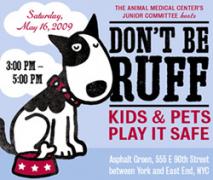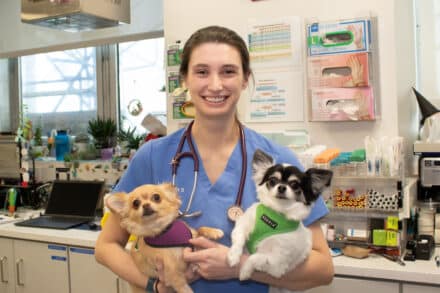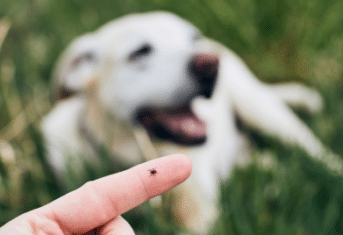How to Prevent Dog Bites

How to Prevent Dog Bites
May 17-23 is National Dog Bite Prevention Week and The Animal Medical Center (AMC) is kicking it off on Saturday May 16th with “Don’t Be Ruff,” a dog safety fair at Asphalt Green on Manhattan’s Upper East Side. This event, sponsored by the Veterinary Medical Association of New York City, New York City Department of Health and Mental Hygiene, Asphalt Green, Ada Nieves and Prima Dog, DoDo, and , Dick Flanagan-State Farm Insurance , is being held from 3:00-5:00 p.m. and is free! The event will be educational and fun for all age groups.
Dog bite injuries are a serious issue and comprise one percent of all emergency room visits. The good news is that dog bites are a preventable health concern. Prevention of dog bite injuries requires education about risk factors and avoidance strategies. These two issues will be the target of Saturday’s “Don’t Be Ruff” event, with educational information developed by AMC staff veterinarians. Friendly well trained dogs will be at the event to allow children to practice safe dog interactions.
Fortunately, due to research by veterinarians and physicians, we have identified easily modifiable risk factors associated with dog bite injuries. Those at greatest risk for being bitten are children between five and nine years of age. Most bite injuries in children are inflicted by a dog known to them, either the family dog or a neighbor’s dog. Postmen, home health care workers and meter readers are also at increased risk. Entering a dog’s “space,” interacting with a dog while it is eating or surprising a sleeping dog can provoke even a gentle dog to bite.
Certain dogs are more likely to be involved in bite injuries. Intact (not neutered) male dogs are three times more likely to be involved in dog bite injuries. Dogs that are kept tied up outdoors can be territorial, making them more prone to biting. Dogs with medical conditions are more likely to bite than dogs that are healthy.
Additionally, more bite injuries occur in the summer months, perhaps because children and dogs are frequently together outdoors or perhaps dogs are cranky, just like the rest of us are when it is hot and sticky outside.
The veterinarians at The Animal Medical Center recommend proper care and training of the family dog to help prevent bite injuries because behavior is a reflection of both emotional and physical health. The AMC suggests every dog see its veterinarian annually to spot any correctable health problems early. Due to their increased risk for biting, all male dogs should be neutered at about six months of age. Spaying is done in female dogs at the same age, but for different health benefits. Obedience training teaches dogs to politely interact with humans and other dogs and will make a dog less likely to bite.
Several simple steps can help protect family members from dog bite injuries. All children should be taught the steps of safely interacting with dogs and coached to ask a dog owner if he/she can pet a dog they meet. Parents should be extra vigilant about dog safety in the summer, since most dog bite injuries occur in the warmer months. All interactions between children and the family dog should be supervised. Playing with your dog is important, but the games you play should not be tug of war or chasing games which could get out of control and lead to an inadvertent bite. When walking your dog, it should be under your control on a leash to allow you to prevent an unwanted interaction with a stranger or strange dog.
Following these guidelines can help keep you and your dog safe. Join us next Saturday, May 16th at “Don’t Be Ruff” and find out how to play it safe with your beloved pets. For additional information about this event, please contact Courtney Rabb at 212.329.8666 or courtney.rabb@amcny.org or visit amcny.gbtesting.us.
_______________________________
For nearly a century, The Animal Medical Center has been a national leader in animal healthcare, known for its expertise, innovation and success in providing routine, specialty and emergency medical care for companion animals. Thanks in part to the enduring generosity of donors, The AMC is also known for its outstanding teaching, research and compassionate community funds. Please help us to continue these efforts. Send your contribution to: The Animal Medical Center, 510 East 62nd Street, New York, NY 10065. Visit amcny.gbtesting.us for more information.
































